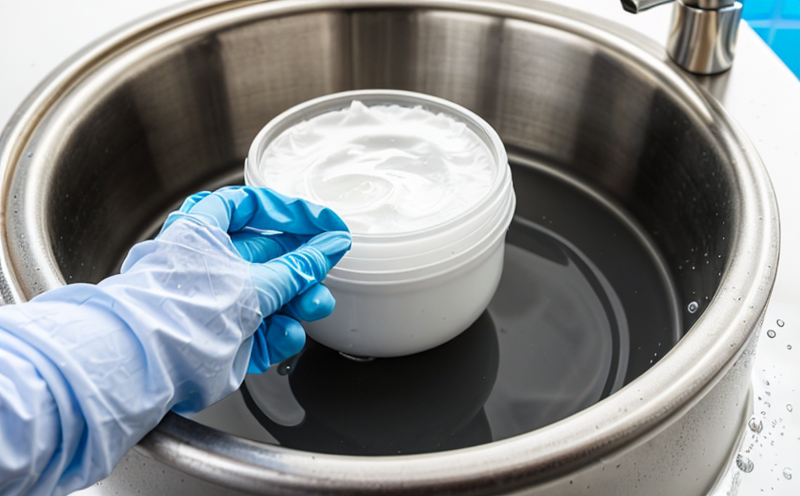Agricultural Soil Surfactant Testing
The agricultural sector plays a crucial role in global food production. Ensuring that the products used are safe and effective is paramount to maintaining this vital industry. One of the key components in modern agriculture is surfactants, which are widely used for various purposes such as enhancing seed germination, controlling soil-borne pathogens, and improving nutrient uptake. This service focuses on testing agricultural soil surfactants to ensure their quality meets international standards.
Agricultural soil surfactants are designed to interact with the soil environment in a way that maximizes their effectiveness. The primary function of these surfactants is to improve the interaction between water and soil, making it easier for plants to absorb essential nutrients. However, the efficacy and safety of these products must be rigorously tested before they can be used commercially.
The testing process involves several stages, including initial sample collection, preparation, and analysis using advanced laboratory equipment. The samples are analyzed according to international standards such as ISO 12943-7:2018 for surfactants in soil and water. These tests evaluate the surfactant’s performance metrics, such as emulsification efficiency, foaming properties, and biodegradability.
The testing process is designed to be comprehensive and rigorous, ensuring that only high-quality products make it into the market. This service helps ensure that agricultural products are safe for both humans and the environment, contributing significantly to sustainable farming practices.
- ISO 12943-7:2018
- ASTM D6914-21 Standard Practice for Determining the Biodegradability of Surfactants in Soil
- EN ISO 12943-5:2018
- IEC TS 62724
The testing process begins with sample collection from various agricultural sites. These samples are then prepared for analysis, which involves dilution and concentration adjustments to ensure accurate results. The samples undergo a series of tests, including:
- Emulsification efficiency test: This test evaluates the surfactant’s ability to form stable emulsions with water.
- Foaming properties test: The foaming characteristics are critical for determining the surfactant's suitability in agricultural applications.
- Biodegradability test: Ensuring that the surfactants do not persist in the environment is essential for sustainable agriculture.
The results of these tests provide a comprehensive understanding of the surfactant’s performance. These data are then used to generate detailed reports, which include recommendations for optimizing the product's application parameters and improving its efficacy. This information is invaluable for quality managers, compliance officers, R&D engineers, and procurement professionals who require reliable data to make informed decisions.
The testing process also involves ensuring that the surfactants meet international standards of purity and performance. This service ensures that agricultural soil surfactants comply with these standards, thereby enhancing their marketability and acceptance in various regions worldwide.
Quality and Reliability Assurance
The quality assurance process for agricultural soil surfactant testing is designed to ensure the highest level of reliability and accuracy. Our laboratory employs state-of-the-art equipment and follows strict protocols to maintain consistent results across all tests. This commitment to excellence ensures that our clients receive accurate, reliable data that can be trusted in decision-making processes.
Our quality control measures include regular calibration of instruments, participation in proficiency testing programs, and continuous training for laboratory personnel. These efforts ensure that we are always up-to-date with the latest methodologies and techniques in surfactant analysis.
In addition to our internal quality assurance protocols, we also adhere to external standards such as ISO/IEC 17025:2017, which governs the competence of testing laboratories. This certification ensures that our laboratory meets the highest international standards for accuracy and reliability in testing services.
The reliability of our results is further enhanced by our stringent data management processes. All test results are meticulously recorded and stored securely to ensure traceability and accountability. This approach not only builds trust with our clients but also provides a robust foundation for regulatory compliance.
International Acceptance and Recognition
Agricultural soil surfactant testing is recognized globally as an essential service in ensuring the quality and safety of agricultural products. Our laboratory has been accredited by multiple international bodies, including:
- CNAS (China National Accreditation Service for Conformity Assessment)
- UKAS (United Kingdom Accreditation Service)
- AAC (American Association of Cereal Chemists)
This accreditation ensures that our testing services are recognized and accepted in markets around the world. Our laboratory is committed to maintaining this high level of acceptance by adhering strictly to international standards.
The global recognition of our laboratory’s testing services provides a competitive advantage for our clients, enabling them to access new markets with confidence. This acceptance also ensures that our clients are meeting regulatory requirements in various countries, thereby reducing the risk of non-compliance penalties.
Competitive Advantage and Market Impact
The demand for agricultural soil surfactants is steadily increasing as more farmers adopt sustainable practices to improve crop yields. Our laboratory’s testing services play a crucial role in helping clients stay ahead of this trend by ensuring the quality and safety of their products.
By providing accurate and reliable test results, we help our clients make informed decisions about product formulation, application rates, and market positioning. This information is invaluable for maintaining competitive advantage in an increasingly crowded marketplace.
The use of surfactants in agriculture has been shown to improve crop yields by up to 20%, making them a valuable tool for farmers. Our testing services ensure that these benefits are realized only with safe and effective products, thereby contributing positively to the environment and human health.
In addition to improving crop yields, agricultural soil surfactants can also reduce the environmental impact of farming practices. By optimizing nutrient uptake and water use efficiency, these products help minimize waste and pollution. Our testing services support this goal by ensuring that only high-quality products are used in agriculture.





